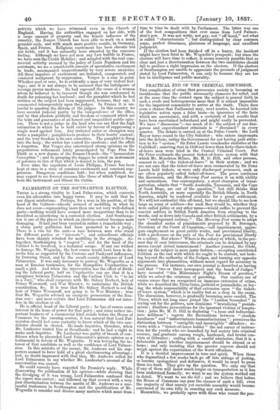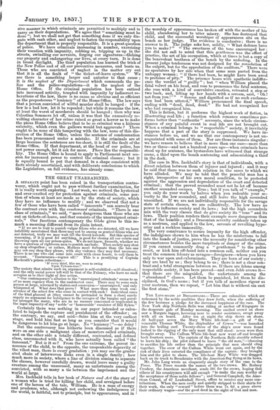PRACTICAL END OF THE CRIMINAL DISCUSSION.
THE complication of crime that persecutes society is becoming so troublesome that the public necessarily clamours for relief, and
at the same time the counsel upon the subject is poured forth in such a crude and heterogeneous mass that it is almost impossible for the impatient community to arrive at the truth. There does seem a chance that Parliament may, next session, be hurried into legislative action upon a false basis—in ignorance of the facts which are ascertained, and with a certainty of bad results that have been ascertained beforehand and might easily be prevented. We have "discussion "—too much of it ; the subject of our dangerous and superabundant criminals is " discussed " in every quarter. The debate is carried on at the Police Courts : the Lord Mayor turns round to the City Solicitor ; who enters impromptu into the debate, rating the Government for not having paid attention to his "system." Sir Peter Laurie vouchsafes statistics at the Guildhall; asserting that in 1856 not fewer than forty-three ticketof-leave men were tried in the Central Criminal Court. But Sir Peter confounds the present ticket-of-leave system with that which Mr. Monckton Mimes, Mr. M. 1). Hill, and other persons, consent to call "the ticket-of-leave" in their system ; and we are not sure that the ticket-of-leave men enumerated by Sir Peter Laurie held tickets, or were only discharged prisoners, such as are often popularly called ticket-of-leave. The press continues the discussion, and the Morning Post carries it on with ability and earnestness. Our contemporary, a stout champion of transportation, admits that "South Australia, Tasmania, and the Cape of Good Hope, are out of the question," but still, thinks that North Australia, or more especially the British Siberia in North America, might be rendered available for a penal settlement. We will not contradict this off-hand, but we should like to see how large an army of soldiers—for such they would be, whether they were called police or any other name—would suffice to prevent the convict settlers in British North America from straying to the woods, and so down into Canada and other British settlements, by a new "underground railway." The Morning Post seems to adopt the classified series of punishments proposed by M. Berenger, President of the Court of Cassation,—cell imprisonment, aggregate employment on great public works, and provisional liberty, with a preference on the part of the Post for provisional liberty in a colony. But where ? Where is the colony at which, in the present day of easy intercourse, the criminals can be detained by any means except actual immurement ? Another journal, the Globe, takes up the subject in more janty fashion —accepting constituted Jebbism as the end with which we ought be content, not looking beyond the authority of the Judges, and turning any opposite arguments into pleasantries, without much regard for accuracy in the process. For instance, our own journal is described as having said that "two or three newspapers and the bench of Judges " have invented "this Midsummer Night's Dream of garottes," while we admit the existence of garotting. Our readers are of course aware that we recognized an immense extension of crime, while we described the Titus Oates, judicial or journalistic, as laying the whole responsibility of that extension upon "the ticketof-leave system," which is in reality but as a drop in the ocean. The discussion, however, is gradually becoming more candid. The Times, which not long since Joined the "London Scoundrel" in
crying out for the gallows, now disclaims " brutalizing " punishmeats; disallows persecutions for the ignorant victims of temptation; joins Mr. M. D. Hill in deploring "a loose and indiscrimi nate mildness " ; regrets the fluctuations between "obsolete harshness" and "indiscriminate humanitarianism " ; perceives the distinction between "corrigible and incorrigible" offenders • re
views with a "ticket-of-leave holder" the sad career of instruc
tion for the youths who are launched by bad society into criminal courses, and graduate among rough, hardened, and brutal con
victs at Gibraltar; ending with a candid admission, that it is a debateable point whether imprisonment should be abroad or at home ; and only insisting that the greater expense should not weigh against the expatriation of the worst offenders.
It is a decided improvement in tone and spirit. When those who dogmatized a few weeks back go off into sidings of jesting, or become apologetical and defensive, it would be cruel to press them too hard. They give up the question. We only say that if any of them will insist much longer on transportation as it has
been understood formerly, we want to see the system worked out in detail. We want to see the bill ; and we believe that before the House of Commons can pass the clauses of such a bill, even the majority of that unruly yet coercible assembly would become convinced of its own folly in enacting any such measure. Meanwhile, we perfectly agree with those who resent the pas sive manner in which criminals are permitted to multiply and to carry on their depredations. We agree that "something must be done "; but we shall not get that something done if we only dispute with each other, and neglect to fasten the responsibility upon the department that is properly 2responsible. It is a great question of police. We have criminals increasing in number, exercising their vocation with impunity, robbing us, tripping us up in the streets, swindling our servants, forging our signatures—filching our property and endangering our lives, at every turn. It is done in broad daylight. The thief population has learned the trick of the New Police and of all our preventive measures, and beats us. Those who are convicted of neglect in the matter cry out that it is all the fault of " the ticket-of-leave system." We see there is something larger and anterior to that cause ; it is the neglect of the Department which commands the police and the police-regulations—it is the neglect of the Home Office. If the criminal population has been enticed into increased activity, tempted with impunity by indiscreet relaxations of the law, there is no cause so obvious and so efficient as the preposterous " leniency " of the Home Office. The law says that a person convicted of wilful murder shall be hanged : if the law is a bad law, let it be repealed ; but while it remains the law, at least the worst of murderers should be hanged ; then why was Celestina Sommers let off, unless it was that the excessively revolting character of her crime raised so great a horror as to make the pious Home Office believe that to be so criminal was a hideous calamity, which even the gallows would but aggravate ? There ought to be none of this tampering with the law, none of this discretion of the Home Office, unless the sentence of condemnation has been pronounced under a mistake. If the criminals are at large because the sentences are too short, it is still the fault of the Home Office. If that department, at the head of our police, has not power enough, let it ask for more. There lies the responsibility. The Home Office is bound to apply to Parliament next session for increased power to control the criminal classes ; but it is equally bound to put that demand in a shape consistent with facts already ascertained, and with deliberate conclusions to which the Legislature, on full evidence, has already come.





























 Previous page
Previous page